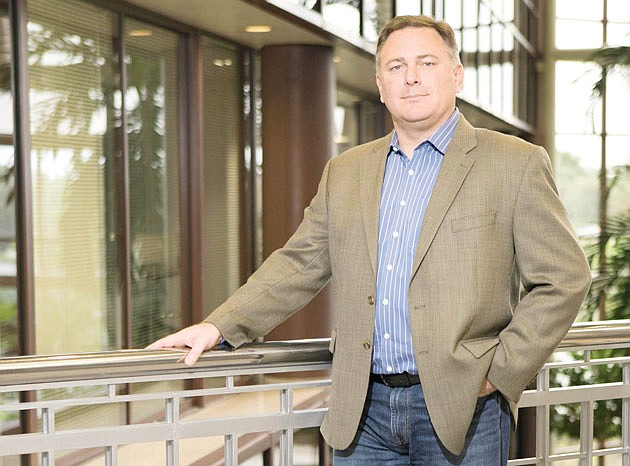- November 24, 2024
-
-
Loading

Loading

By Brian Hartz | Tampa Bay Editor
Forget the Budweiser wagon pulled by the team of Clydesdales. There's a whole lot more to alcohol sales and distribution than there used to be.
Take Fintech. The Tampa firm is a leader in behind-the-scenes booze transactions, with a wide, varied and eclectic clientele that defies its hidden persona. Clients include nearly 4,000 alcohol distributors nationwide, as well as 450,000 retailers, such as bars, restaurants, liquor stores, grocery stores and even gas stations. Corporate names range from Walmart and Wawa to Publix and Trader Joe's.
Using its OneSource software, Fintech — a privately held company founded in 1991 that won the U.S. Chamber of Commerce's Small Business of the Year award in 2010 — processes some 500,000 invoices every week. In financial terms, that represents about $25 billion in payments annually. In August alone, the company processed $2.4 billion in sales and added 11,400 retail clients and 71 distributors.
“We add a little over 10,000 relationships every month,” says Fintech president Tad Phelps. “And that's been going on for quite some time now, a few years.”
Phelps says Fintech's success — its sales have doubled in the past five years — can be attributed to its ability to help businesses navigate the byzantine laws and regulations that govern alcohol sales. Those laws can vary not only from state to state, but also county to county, making a one-stop shop like Fintech nearly essential for many distributors. (The company declines to disclose specific sales figures.)
“A lot of folks don't understand how alcohol works,” says Phelps. “In Florida, if you get beer at a restaurant you're paying cash at the back door when it comes in. Cash, money order, check, but you have to make payment right then. But let's say you're the delivery driver and you show up during the lunch hour ... well, maybe the manager's busy, or the owner's not in or he's at the bank getting change. The driver has to wait for him to come back. The driver, he has to do maybe 20 stops in a day. But he needs his money before he can leave.”
Phelps says that's the niche Fintech has filled — essentially, it's a back-end, automated clearinghouse for the payment process between alcohol distributor and retailer, and it manages transactions according to the specific laws of whatever locality in which the sale takes place.
“The driver drops off the delivery, the [retailer] signs the purchase order, and the driver goes [to his next stop]. Then, electronically, we take the funds and we transfer them through. We've found that the distributors can pick up three to four more stops a day on a truck just by not having to wait for payment. If you can do that, you need fewer trucks, you need fewer people. And you're getting more product out, quicker ... it's a better way to do business.”
The retailer that buys the booze also sees greater efficiency, Phelps adds. Fintech can move the money electronically on the exact date the retailer requests, ensuring both sides know precisely when the transaction will take place. Additionally, says Phelps, Fintech's extensive regulatory knowledge ensures payments are made in accordance with local laws governing alcohol sales.
Fintech's OneSource system has lured, and retained, some of the biggest entities in the retail world — for example, Target, which recently renewed an agreement that will see Fintech manage relationships with 749 of the retailer's 814 alcohol distributors. Target and Fintech first began working together in 2003; the new multi-year deal means Fintech will handle the vast majority of alcohol distribution transactions for the Minneapolis-based retail giant.
Keeping up with the growth that comes from big deals like the one with Target has been a challenge, says Phelps, which is why the company has grown from 60 to 110 employees over the past 18 months. It's also starting to invest heavily in automation. “When you grow that fast,” he says, “you never quite keep up internally with the technology.”